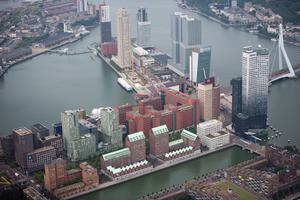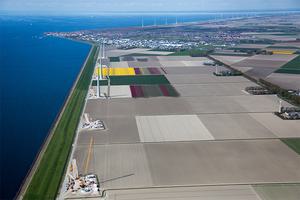Europe
-
The Rapid and Startling Decline Of World’s Vast Boreal Forests
Scientists are becoming increasingly concerned about the fate of the huge boreal forest that spans from Scandinavia to northern Canada. Unprecedented warming in the region is jeopardizing the future of a critical ecosystem that makes up nearly a third of the earth’s forest cover.
-
One Scientist’s Hopeful View On How to Repair the Planet
Ecological crises may be piling up in a seemingly hopeless cascade, but Swedish scientist Johan Rockström says the next few decades offer an unparalleled opportunity to undo the damage.
-
Natura 2000: EU Reserves Are Facing Development Pressures
An astonishing 18 percent of the European Union’s land area is protected under a network of preserves known as Natura 2000. Now, at the urging of business interests and farmers, the EU is examining whether regulations on development in these areas should be loosened.
-
A Clash of Green and Brown: Germany Struggles to End Coal
A recent battle over imposing a “climate fee” on coal-fired power plants highlights Germany’s continuing paradox: Even as the nation aspires to be a renewable energy leader, it is exploiting its vast reserves of dirty brown coal.
-
Cloning a Mammoth: Science Fiction or Conservation Tool?
Biologist Beth Shapiro has published a new book that looks at the many questions — both technical and ethical — surrounding any attempt to revive extinct species. In a Yale Environment 360 interview, she explains why she believes new genetic technology could benefit critical ecosystems.
-
Can the North Sea Wind Boom And Seabird Colonies Coexist?
Offshore wind farms have been proliferating in the North Sea, with more huge projects planned. But conservationists are concerned this clean energy source could threaten seabird colonies that now thrive in the sea’s shallow waters.
-
On the Internet, Illegal Trade In Endangered Wildlife Thrives
On eBay and elsewhere on the Internet, illegal wildlife and wildlife parts — from elephant ivory to tiger skins to monkey and crocodile skulls — are being sold. Bringing an end to this illicit activity is proving to be a daunting challenge.
-
With Too Much of a Good Thing, Europe Tackles Excess Nitrogen
In Germany, the Netherlands, Denmark and other countries, European governments are beginning to push farmers, industry, and municipalities to cut back on fertilizers and other sources of nitrogen that are causing serious environmental harm.
-
Climate Consensus: Signs of New Hope on Road to Paris
After years of frustration and failure, a more flexible approach to reaching an international strategy on climate action is emerging — and it could finally lead to a meaningful agreement at climate talks in Paris later this year.
-
Wood Pellets: Green Energy or New Source of CO2 Emissions?
Burning wood pellets to produce electricity is on the rise in Europe, where the pellets are classified as a form of renewable energy. But in the U.S., where pellet facilities are rapidly being built, concerns are growing about logging and the carbon released by the combustion of wood biomass.
-
How Tiger Farming in China Threatens World’s Wild Tigers
In an interview with Yale Environment 360, wildlife activist Judith Mills describes how the legal farming of tigers in China is fostering a trade in tiger bone wine and skins that is imperiling the world’s beleaguered population of wild tigers.
-
In Romania, Highway Boom Poses Looming Threat to Bears
Romania, one of Europe’s poorest nations, badly needs a modern highway system. But conservationists warn that unless the movements of wildlife are accommodated, a planned boom in road construction could threaten one of the continent’s last large brown bear populations.
-
For Cellulosic Ethanol Makers, The Road Ahead Is Still Uphill
While it has environmental advantages over other forms of ethanol, cellulosic ethanol has proven difficult to produce at commercial scale. Even as new production facilities come online in the U.S., a variety of economic and market realities suggest the new fuel still has big challenges to overcome.
-
How Norway and Russia Made A Cod Fishery Live and Thrive
The prime cod fishing grounds of North America have been depleted or wiped out by overfishing and poor management. But in Arctic waters, Norway and Russia are working cooperatively to sustain a highly productive — and profitable — cod fishery.
-
How to Make Farm-to-Table A Truly Sustainable Movement
Chef Dan Barber says the farm-to-table movement that he helped build has failed to support sustainable agriculture on a large scale. To do that, he says in a Yale Environment 360 interview, we need a new way of looking at diverse crops and the foods we eat.
-
As Small Hydropower Expands, So Does Caution on Its Impacts
Small hydropower projects have the potential to bring electricity to millions of people now living off the grid. But experts warn that planners must carefully consider the cumulative effects of constructing too many small dams in a single watershed.
-
On Front Lines of Recycling, Turning Food Waste into Biogas
An increasing number of sewage treatment plants in the U.S. and Europe are processing food waste in anaerobic biodigesters, keeping more garbage out of landfills, reducing methane emissions, and producing energy to defray their operating costs.
-
On the Road to Green Energy, Germany Detours on Dirty Coal
While Germany continues to expand solar and wind power, the government’s decision to phase out nuclear energy means it must now rely heavily on the dirtiest form of coal, lignite, to generate electricity. The result is that after two decades of progress, the country’s CO2 emissions are rising.
-
Mimicking Nature, New Designs Ease Fish Passage Around Dams
Originating in Europe, \"nature-like\" fishways are now being constructed on some U.S. rivers where removing dams is not an option. Unlike traditional fish ladders, these passages use a natural approach aimed at significantly increasing once-abundant runs of migratory fish.

